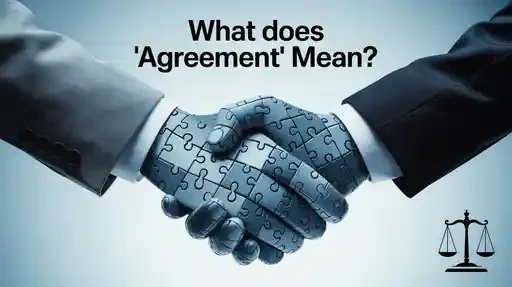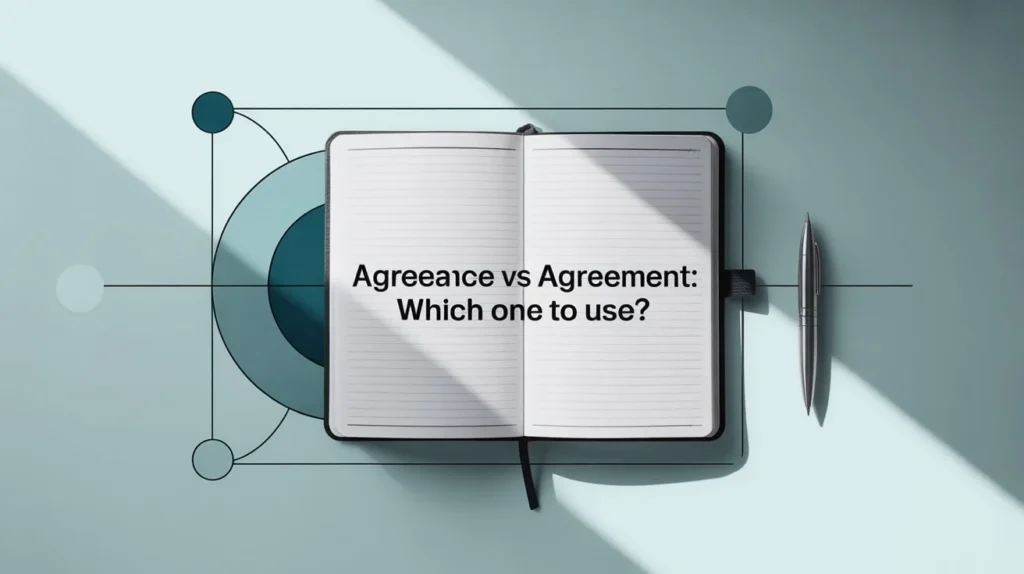Language can be tricky, and sometimes tiny differences in word choice make a huge impact. A perfect example is the confusion between agreeance vs agreement. Many people assume these words are interchangeable, but in reality, only one fits most situations. Misusing them can make your writing sound awkward or even unprofessional.
You might have seen someone write, “His agreeance was clear,” and thought it sounded fine. But in professional, academic, or formal writing, that sentence could raise eyebrows. On the other hand, “agreement” fits naturally and conveys clarity. Knowing the difference not only sharpens your writing but also boosts your credibility.
In this guide, you’ll learn exactly what each word means, when and how to use them correctly, and why one is overwhelmingly preferred over the other. By the end, you’ll confidently choose the right word every time, whether you’re drafting an email, signing a contract, or writing an article. We’ll break down grammar rules, common mistakes, real-world examples, and even provide a quick cheat sheet to make your life easier.
Understanding this distinction is more than a grammar lesson—it’s a step toward writing like a professional. So, let’s dive in and clear up the confusion once and for all.
What Does “Agreement” Mean?

Agreement is by far the most commonly used and accepted term in modern English. It refers to a mutual understanding or a contract between two or more parties.
- Definition: A negotiated and accepted understanding between parties.
- Forms: Can be verbal, written, formal, or informal.
- Origins: Middle English agreement, derived from Old French agreer, meaning “to please” or “to bring into concord.”
Examples of “Agreement” in Sentences
- “The two companies reached an agreement on the new partnership.”
- “We finally signed the agreement after weeks of negotiations.”
- “A verbal agreement can sometimes be as binding as a written one, depending on the context.”
Collocations with Agreement
Knowing common pairings can help you use the word naturally:
- Reach an agreement
- Binding agreement
- Mutual agreement
- Formal agreement
- Written agreement
These phrases are widely recognized in professional writing, legal documents, and casual conversation.
What About “Agreeance”?
Agreeance is far less common and is rarely considered correct in modern English. Some sources list it as a noun meaning “the state of agreeing,” but it is mostly a misformation of agreement.
- Definition: The state of agreeing, theoretically.
- Usage: Mostly nonstandard, archaic, or incorrect in formal writing.
- Origins: Derived from modern attempts to create a noun from “agree,” but it never gained widespread acceptance.
Examples of “Agreeance” in Sentences
- Incorrect: “His agreeance with the decision was obvious.”
- Awkward: “We appreciated her agreeance on the plan.”
As you can see, these sentences sound clunky and unnatural. In professional contexts, using agreement instead is always safer.
Why “Agreement” Works Better

From a grammar and style perspective, agreement fits neatly in sentences, whereas agreeance often feels forced.
- Agreement: natural, standard, recognized by dictionaries and style guides.
- Agreeance: rarely accepted, can distract the reader, and may even appear uneducated.
Style Guide Recommendations
- Merriam-Webster: Lists agreement as the correct noun form, with no endorsement of “agreeance.”
- Oxford English Dictionary: Marks agreeance as archaic or rarely used.
- APA Style: Recommends using agreement in professional writing.
If you aim for credibility in any type of communication, choosing agreement is the clear winner.
Common Mistakes and Misconceptions
Many people assume agreeance is correct because it follows a regular word-formation pattern: verb + -ance. While logical, English rarely follows strict rules without exceptions.
Common misconceptions:
- Agreeance = correct: False
- Agreement only for contracts: False (works in casual and formal writing)
- Agreeing can replace both: Partially true, but “agreement” is often preferred as a noun.
Think of it this way: “agreeing” is an action, while “agreement” is the result or state of that action.
Quick Rules and Cheat Sheet
Here’s a table for easy reference:
| Word | Correct Use | Example | Notes |
| Agreement | Standard noun for mutual consent | “We reached an agreement.” | Always correct in formal use |
| Agreeance | Rare, mostly incorrect | “His agreeance was obvious.” | Avoid in professional writing |
Simple Guidelines
- Always default to agreement.
- Use agreeing when describing the action of sharing a viewpoint.
- Avoid agreeance unless quoting historical or archaic text.
Tips for Confident Usage
- Business writing: Always use agreement. It shows professionalism.
- Academic writing: “Agreeance” is considered nonstandard; stick to agreement.
- Casual writing: Even in informal emails, agreement is preferred for clarity.
Examples from Real Writing
- Legal document: “The parties entered into a binding agreement on June 12, 2023.”
- Journalism: “The union and the company reached an agreement after months of negotiations.”
- Casual: “We’re all in agreement about the plan.”
Related Words and Phrases
Using synonyms or related phrases can add variety without losing clarity:
- Consent – Emphasizes permission.
- Accord – Formal, often legal or diplomatic.
- Consensus – Group agreement, often informal.
- Deal – Casual agreement.
Common Idioms
- “Come to an agreement” – Reach mutual understanding
- “Break an agreement” – Violate terms of a contract
- “Mutual agreement” – Shared understanding
Using these phrases correctly can make your writing more engaging and precise.
FAQs About Agreeance vs Agreement
Is “agreeance” ever acceptable?
- Only in rare historical or literary contexts. In modern English, it’s best avoided.
Can “agreement” be used in casual conversation?
- Absolutely. It works in both formal and informal contexts.
What are some synonyms for “agreement”?
- Consent, accord, deal, consensus. Context determines which works best.
How do I remember the difference?
- Agreement = widely accepted, professional, correct.
- Agreeance = awkward, mostly incorrect, rarely used.
Conclusion
When it comes to agreeance vs agreement, the choice is clear. Agreement dominates in modern English for professional, academic, and casual writing. Misusing “agreeance” can make sentences sound clumsy and may hurt your credibility.
Remember these key points:
- Use agreement for contracts, mutual understandings, and any formal writing.
- Reserve agreeing for actions or ongoing opinions.
- Avoid agreeance unless you’re quoting historical or archaic sources.
Choosing the right word builds clarity, trust, and professionalism. With this knowledge, you’ll never stumble over agreeance vs agreement again. Every email, report, or article you write will read cleaner, sound smarter, and make your readers trust your expertise.




